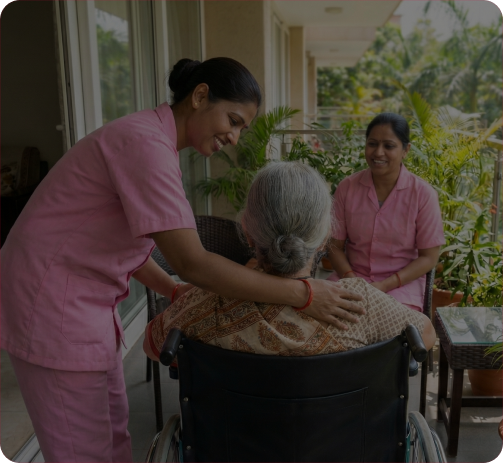Mental health struggles transcend age, yet there's a heavy shroud of stigma specifically surrounding elderly mental health. This article delves into the importance of mental well-being for older adults, explores strategies for addressing stigma, and highlights the crucial role of education and support systems. Together, let's shine a light on the often-overlooked topic of mental health in the elderly and discover ways to enhance their quality of life through compassion and awareness.
As we age, nurturing mental well-being becomes increasingly vital, significantly influencing our overall quality of life and sense of fulfillment. The mental health challenges faced by the elderly, such as depression, anxiety, and cognitive impairments from conditions like dementia and Parkinson’s, are profoundly impactful, especially when left undiagnosed and unacknowledged. Physical health issues, lack of mobility, and social isolation further exacerbate these challenges.
Recognizing the importance of mental health in older adults is the first step towards ensuring their overall well-being. Mental health care can significantly improve their quality of life, fostering a sense of purpose, improving physical health, and enhancing social connections. A compassionate approach to mental health can transform the lives of many elderly individuals, helping them lead fulfilling lives.
Addressing the Stigma Surrounding Elderly Mental Health Well-being
Stigma remains one of the most significant barriers to mental health care for older adults. Many in our society view mental health issues as a sign of weakness or an inevitable part of aging, leading to shame and reluctance to seek help. This societal judgment not only hinders individuals from accessing necessary care but also perpetuates myths and misconceptions about mental health in the elderly. The impact of stigma surrounding mental health in the elderly extends beyond the individuals directly affected. Family members and caregivers also bear the weight of societal bias. They may encounter judgment, guilt, and a sense of shame as they navigate the complexities of caregiving. The fear of being labeled or misunderstood can prevent individuals from seeking the support and resources they desperately need.
The fear of being labeled or misunderstood can be overwhelming, causing many elderly to suffer in silence rather than reach out for the support they need. Additionally, families and caregivers might lack the knowledge or resources to recognize and address these issues effectively, further exacerbating the problem.
Overcoming this stigma requires concerted efforts in education, community engagement, and policy-making to ensure that mental health care is seen as a vital component of overall well-being, rather than a hidden or shameful issue. By fostering a culture of understanding and acceptance, we can create an environment where our elders feel empowered to seek help and maintain their mental health with dignity and respect.
Challenging Stigma & Promoting Mental Health Well-being Through Education and Awareness
Promoting mental health well-being through education and awareness is crucial in addressing the stigma surrounding elderly mental health. By providing information and resources, we can empower the elderly to prioritize their mental well-being just as much as their physical health. Healthcare providers, caregivers, and family members must be equipped with the knowledge to recognize signs of mental health issues and provide appropriate support. Training programs for caregivers can offer valuable insights into managing mental health conditions with empathy and competence.
Education plays a key role in helping individuals recognize signs of mental health issues and seek appropriate support. When the elderly are equipped with knowledge about common mental illnesses and available treatments, they are more likely to take proactive steps towards maintaining good mental health. Raising awareness about the importance of mental well-being among elders can help break down misconceptions and stereotypes. By fostering open conversations and challenging age-related stigmas, we create a culture that values and supports the emotional wellness of older adults.
Through community programs, workshops, and online resources, we can reach a wider audience and promote understanding around elderly mental health issues. By working together to educate ourselves and others, we contribute to a society that prioritizes holistic well-being for all ages.
Dispelling Misconceptions
To combat stigma, it is crucial to dispel misconceptions about mental health in the elderly. One prevalent misconception is that mental health issues are a normal and unavoidable part of aging. In reality, while the risk of mental health conditions can increase with age, they are not an inevitable consequence of growing older. Mental health issues such as depression, anxiety, and cognitive disorders in the elderly are complex conditions that require appropriate attention and care. They are not simply a byproduct of aging but rather medical conditions that can and should be treated.
Another misconception is that elderly individuals with mental health issues are no longer capable of meaningful engagement or contributing to society. This belief is not only incorrect but also harmful. Many older adults continue to lead fulfilling lives, engage in community activities, and contribute to society in significant ways, even when managing mental health conditions. By assuming they are incapable, we undermine their inherent worth and potential, perpetuating a cycle of exclusion and neglect.
Furthermore, the idea that older adults cannot benefit from mental health interventions, such as therapy or medication, is misleading. Many elderly individuals respond well to these treatments, experiencing significant improvements in their quality of life. It is essential to recognize that mental health care can be just as effective for older adults as it is for younger populations.
Addressing these misconceptions involves increasing awareness and education about the realities of mental health in aging. By promoting a more accurate understanding, we can foster a more compassionate and supportive environment where older adults feel valued and empowered to seek the help they need.
Cultivating Empathy for Elderly Mental Health
Creating a future where elderly mental health is understood and valued requires a collective effort grounded in empathy. We must challenge stereotypes and prejudices, advocating for comprehensive mental health care for older adults. By fostering a culture of empathy and support, we ensure that our elderly population receives the care and respect they deserve.
Empathy is a powerful tool in dismantling the stigma surrounding mental health in the elderly. Shifting the narrative from despair to understanding and compassion involves placing ourselves in the shoes of elderly individuals and their caregivers. This perspective helps us appreciate their challenges and triumphs more deeply.
Empathy involves actively listening to older adults, acknowledging their struggles, and validating their feelings. It means recognizing that mental health issues are legitimate health concerns, not signs of weakness. Approaching elderly mental health with empathy breaks down barriers, enabling meaningful conversations about their needs.
Promoting empathy changes societal attitudes, reducing the fear and shame associated with mental health issues in the elderly. This cultural shift encourages older adults to seek help without fear of judgment, fostering a supportive environment where their mental health is prioritized.
Hope Over the Horizon: Epoch's Approach to Mental Well-Being
At Epoch Elder Care, the essence of eldercare transcends mere physical well-being, embracing the crucial dimension of mental health to ensure a holistic and fulfilling life for their residents. Epoch recognizes that any comprehensive eldercare approach must seamlessly integrate physical, emotional, and psychological support. Their commitment is to create an inclusive and compassionate environment where mental health is prioritized.
Through their personalized care programs, Epoch offers thorough assessments, individualized care plans, psychotherapy, counseling services, psychiatric evaluations, and medication management. They also place significant emphasis on supporting families and caregivers, acknowledging their critical role in the mental well-being of the residents.
Mental well-being is seen as a cornerstone of quality of life at Epoch, fostering motivation and positivity despite the challenges of aging. The organization firmly believes that in India, there is a pressing need for more trained mental health professionals, enhanced funding for research, and comprehensive insurance coverage for chronic mental health conditions. Epoch Elder Care is dedicated to breaking the stigma associated with mental health challenges in the elderly, promoting empathy, and providing hope through their holistic and compassionate approach to eldercare.
FAQ’s
What is the stigma around mental health in the elderly?
The stigma around mental health in the elderly includes misconceptions that mental health issues are a normal part of aging, a sign of weakness, or not as important as physical health. This stigma leads to shame, reluctance to seek help, and a lack of understanding and support for mental health needs in older adults.
How can we break down the stigma of mental health?
We can break down the stigma of mental health by promoting education and awareness, fostering open conversations, and challenging misconceptions. Providing accurate information about mental health conditions and their treatability helps change negative attitudes. Encouraging empathy and understanding, training healthcare providers and caregivers, and advocating for mental health support can also create a more accepting and supportive environment for those affected.
What is the most stigmatized mental illness?
The most stigmatized mental illness is often considered to be schizophrenia. This condition is frequently misunderstood and associated with fear, misinformation, and negative stereotypes. People with schizophrenia are commonly perceived as unpredictable or dangerous, despite the fact that most individuals with the disorder are not violent and can lead fulfilling lives with proper treatment and support. The stigma surrounding schizophrenia can lead to social isolation, discrimination, and significant barriers to accessing care.













